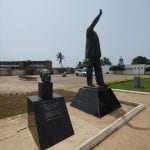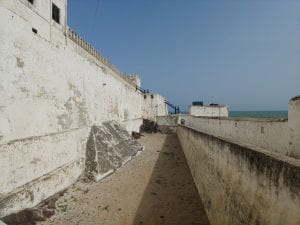On February 21-23, 2019, GEO participated in and presented at the Third Triennial conference on International Education “Studying Abroad in the Republic of Ghana: Preparing Students for Global Citizenship” held in Accra, Ghana. Lisa Calevi, Assistant Director of Institutional Relations, and Patrick McMurdo, GEO Program Coordinator, joined a cohort of approximately 75 individuals from both U.S. and Ghanaian institutions of higher education at the gathering. The conference explored the impact of globalization on Ghana from all angles, including keynotes on “What Makes Ghana So Special” by Playwright Esther Armah, and “Globalization and the Challenges it Imposes on International Education,” by Prof Ama de-Graft, Dean, International Programs Office, University of Ghana. GEO was also joined at the conference by two recipients of the GEO Ghana Travel Grant, hailing from Prairie View A&M (Texas) and Southern University (Louisiana).
One conference session entitled “Opportunities and Challenges for Majority White and Historically Black Colleges and Universities”, presented by Ms. Davis-Poe of Lincoln University, Dr. Ammah of Hampton University and Ms. Imara of Merritt College, was particularly relevant given GEO’s collaboration with two HBCUs, Xavier University and Southern University, on its newest program at the Aya Center in Accra: “African Diaspora Studies in New Orleans and Ghana”. The program, which takes place in Summer 2019, will explore the transformative journey of African to Africans living in America, and examine the broad spectrum of the human experience related to the African diaspora. Coincidentally, the President of Ghana, Nana Addo Dankwa Akufo-Addo, declared 2019 as the year of return for people in the Africa Diaspora. For students participating on this GEO program, the experience is likely to be a powerful one. Ghana was the first country in Africa to gain independence from European colonizers and still has many markers of its history at the center of the Transatlantic Slave Trade. One of these, the Elmina Slave Castle on the Cape Coast, was part of a conference excursion that powerfully illustrated the horrific conditions in which Africans were enslaved prior to their deportation to the Americas.
In addition to applying an historical lens, Ghana offers countless ways to encounter its people and culture, including arts, health and development issues, and more. With recurring and emerging GEO program tracks in Global Health, Development, and the Arts on offer, students are sure to find a program fit in one of the most fascinating countries in West Africa. For more information on the GEO’s programs in Accra, Ghana, please visit https://geo.uoregon.edu/centers/accra.


